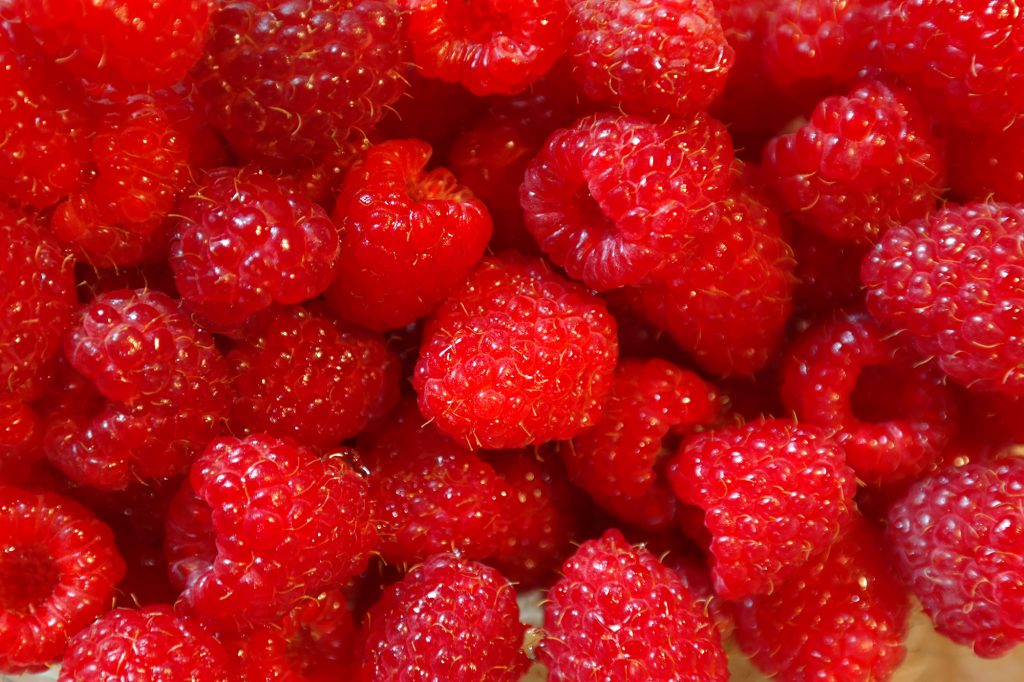Raspberries to Promote Heart Health

Raspberries are low calorie, convenient, great tasting, and provide a variety of nutrients. An excellent addition to your diet.
Fiber to lower cholesterol
Fiber is a key nutrient to combat high cholesterol levels and promote heart health. Dietary fiber binds to cholesterol in circulation and helps remove it from the body. Raspberries provide 12.5 grams/100 kcal (Calories).
For comparison…
High fiber cereals = 6 g fiber/100 kcal
Apple = 4.6 g fiber/100 kcal
Banana = 2.9 g fiber/100 kcal
Grapes = 1.3 g fiber/100 kcal
Most American’s consume about half the daily fiber recommendation of 25 to 35 grams per day. Raspberries are a useful tool for easily increasing your fiber intake. One cup of raspberries provides 8 grams of fiber.
Anthocyanins to lower blood pressure
Endothelial function is compromised with atherosclerotic disease. By providing the body with enhanced oxidative defenses, such as anthocyanins, you increase the nitric oxide released to relax blood vessels leading to vasodilation. This vasodilation promotes lower blood pressure levels. The anthocyanins found in raspberries have been shown to promote vasodilation of blood vessels in studies.
A little chemistry explanation
Quick chemistry lesson so you can better understand a couple terms.
Oxidation is the loss of electrons from atoms, which increases oxidative status. This is not good for your health. Reduction is the gain of electrons to atoms, which decreases oxidative status. This is good for your health.
Oxidation and reduction are played out continuously within your system. The foods you eat impact the oxidative state of your body as a whole…increasing or decreasing oxidation.
Your goal for promoting optimal health is to reduce oxidative status as much as possible. Think of oxidation as rusting or aging. Not what we want.
Health benefits connects to raspberries
Enhance oxidative defenses
- Oxidative stress increases the risk of oxidative damage to cellular components, such as DNA, lipids, and protein.
- The body works to counteract and manage oxidative stress. The more stress to the body, the more difficult it is for the body to balance oxidation and reduction. Aging decreases the body’s ability to counteract stresses.
- Fruit contains nutrients and phytochemicals to enhance our natural defense system and promote decreased oxidative stress.
- Research has found raspberries to decrease lipid oxidation, decrease oxidation of LDL cholesterol, decrease DNA damage, and increase antioxidant enzyme activity.
Anti-inflammatory
- Inflammation usually goes hand-in-hand with oxidative stress. Oxidation status of cells impacts cell communication in regards to their response to inflammation.
- Phytochemicals found in raspberries – ellagitannin, ellagic acid, and anthocyanins – have anti-inflammatory properties.
- Do you live with arthritis? Research shows raspberries to decrease cartilage damage.
Improved immune function
Improve cell-to-cell communication
Altered estrogen metabolism
Cause cancer cells to die/detoxify carcinogens
Repairs DNA
Enhanced glycemic control by increasing insulin sensitivity
Improved endothelial function
Selecting and storing the right berry
Raspberries do not have a long shelf life. They are perishable, so do not buy more than you can eat at one time. They are usually good stored in the refrigerator for a couple days prior to use.
Select berries that are fully ripe. They should be firm, plump, and deep in color. Avoid soft or mushy berries. If your container has any soft or moldy berries, remove them right away so they don’t affect the other berries.
You can easily freeze raspberries. Wash them gently, pat dry with a paper towel, then arrange in a single layer on a cookie sheet and place in the freeze. After they are frozen, you can transfer them to a freezer bag or container for storage. You can store them frozen for up to one year.
How to boost raspberry intake
- Add to breakfast cereal…hot or cold cereals
- Add to plain yogurt
- Use to top waffles or pancakes
- Use to make a sauce for dessert
- Best option…gently wash and eat fresh as a delicious snack!
Are you working to lower blood pressure levels? If so, access the free ecourse “7 Natural Ways to Lower Blood Pressure” at http://lowerbloodpressurewithlisa.com.
All the best,
Lisa Nelson RD
Health Pro for HealthCentral
Image courtesy of adamr / FreeDigitalPhotos.net



